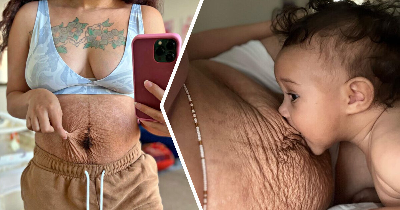
Postpartum bodies often go through significant changes, and in recent years, women have been increasingly sharing the raw reality of their bodies after childbirth. This shift away from idealized depictions of postpartum recovery brings attention to the physical and emotional challenges women face, including stretch marks, loose skin, weight gain, hormonal shifts, and fatigue. These honest portrayals challenge societal expectations and encourage body positivity, fostering an environment where women feel empowered to embrace their bodies, imperfections and all, as a testament to the strength of motherhood.
Such movements on social media, blogs, and personal platforms have given rise to more conversations about self-love, healing, and mental health, emphasizing that postpartum recovery is a unique and deeply personal journey.
The raw truth of postpartum bodies is a stark contrast to the often curated images of “bouncing back” quickly after birth that have been prevalent in media. Women who share their postpartum experiences without filters are breaking down harmful myths and unrealistic expectations surrounding motherhood and the female body.
Physically, postpartum bodies experience a wide range of changes. The abdomen may remain swollen for weeks or months, and the uterus takes time to shrink back to its pre-pregnancy size. The skin around the belly often shows stretch marks, which are common as the body rapidly expands during pregnancy. Many women experience diastasis recti, where the abdominal muscles separate, leaving the stomach appearing softer or more pronounced. Swelling, hair loss, and varicose veins are also common, while breastfeeding can lead to further changes in breast shape and size.
Emotionally, this raw vulnerability also speaks to the mental challenges many women face, such as postpartum depression, anxiety, and body dysmorphia. The hormonal shifts can be dramatic, leading to mood swings and a complicated relationship with one’s self-image. The emphasis on the “bounce-back” culture can exacerbate these feelings, leaving women to feel inadequate if they don’t conform to societal expectations.